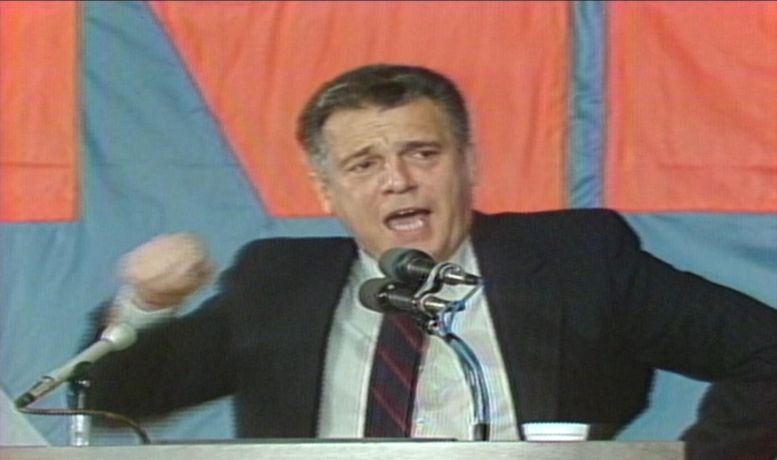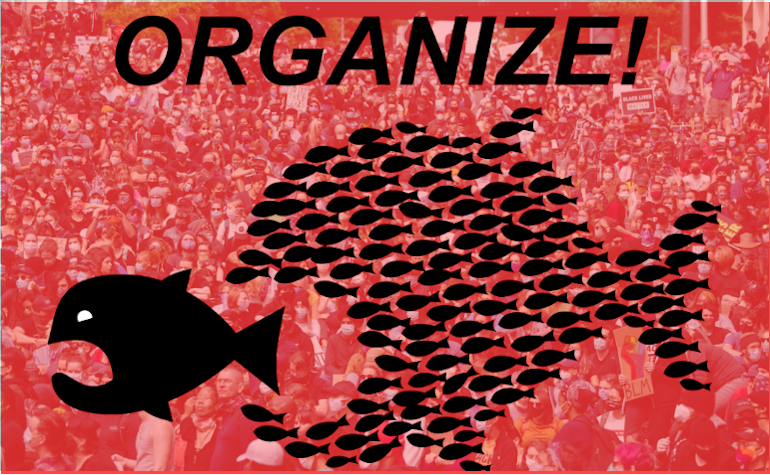Are we here for a good time, Dave Barrett the new Premier asked at his first cabinet meeting. The answer was yes! Fifty years ago in the fall of 1972, the first NDP government in BC set to work on a powerful program of change to improve life for most in BC.
A Landslide Victory
After Social Credit, led by WAC Bennett, had run BC for 30 years, change was in the air. The right wing was divided among three parties — Social Credit (Socreds), Liberals and Conservatives. The NDP ran an energetic campaign with big rallies and smaller meetings in towns and villages across the province.
The NDP’s vote jumped from the 34 percent it had won in 1969 to 40 percent. The Socreds went from 38 seats to just 10, as their vote fell sharply from their previous 47 percent to 31 percent. Their votes splintered to the Liberals, gaining 16 percent, and Tories with 13 percent. The NDP won 38 out of the 55 seats.
Unlike today, the NDP won seats in almost every part of the province. The 17 seats of the Socreds, Liberals and Tories were concentrated in the rich parts of Metro Vancouver (Point Grey and part of the North Shore), Greater Victoria, the Okanagan, the Fraser Valley and Peace River. The NDP won 20 of the 24 seats in Metro Vancouver, 5 of the 9 seats on Vancouver Island, 6 of the 8 seats in the northern half of BC, and 6 of the 11 seats in the Interior. The only region it did not have a majority was in the Fraser Valley with 1 out of 3 seats. It was a BC-wide victory.
A Whirlwind of Action
The newly elected government didn’t waste time — it got straight to work. In the first fall session it raised the minimum wage from $1.50 to $2 an hour and increased it further to $2.75 by December 1975. They gave teachers the right to bargain over their wages and conditions and gave seniors a guaranteed income of $200 a month and support with prescription costs (Canada still does not have universal pharmacare).
The following year, 1973, more and bolder was to follow. Two historic actions, that no future right-wing government has dared to reverse (although they whittle away at them), were the establishment of the Agricultural Land Reserve (ALR) and the Insurance Corporation of British Columbia (ICBC).
BC has very little good farmland and that was fast disappearing before the ALR was established, with around 6,000 hectares being built over every year. The ALR protected 4.7 million hectares of the better land, 5 percent of the province’s total area. Since then, land has been removed from the ALR for the Site C dam, several housing developments, road expansions and more is under threat due to a planned major expansion of the Port of Vancouver. However, without the ALR much more would have disappeared, and sprawl would be worse around many BC cities.
ICBC, for years, provided affordable auto insurance for residents until the BC Liberals took $1.2 billion out of ICBC to cover lost revenue due to tax cuts to the rich. In recent years, the NDP government restructured ICBC, bringing down costs and premiums.
Among its other long list of actions, the NDP brought in a new labour code that increased workers’ rights and established a Labour Relations Board, which took workers’ rights seriously. They agreed to full collective bargaining rights, including the right to strike, for government employees. Union wages were mandatory on all publicly funded construction projects.
Before 1974 there was no BC-wide ambulance service, with ambulances provided by a mix of volunteers, fire brigades and private operators. The NDP established the BC Ambulance Service, which included an air ambulance wing. The BC Liberal government reorganized the service in 2013, resulting in problems that continue to this day.
The NDP raised welfare rates after years of stagnation and brought in rent controls including vacancy control, which means the landlord cannot jack up rents between tenants.
The government scrapped a planned major third bridge between Vancouver and North Vancouver that would have added to congestion in Vancouver and devoured a lot of land. Instead, they introduced a “sea bus,” a quick passenger-only ferry ride from downtown to the north shore. They ended logging in Cypress Bowl Park on the edge of Vancouver.
The NDP stopped the export of raw logs that sent the best wood (often old growth) and good jobs overseas. The current NDP, despite criticizing this export in opposition, has not stopped the export of raw logs.
The NDP banned pay toilets and corporal punishment in schools. They also increased democratic rights with the introduction of a Human Rights Code and with written records (Hansard) of the proceedings of the Legislature.
The NDP government introduced mineral royalties and increased the royalties on mining coal from $0.25 to $1.50 a ton and boosted corporation taxes from 10 to 12 percent.
In just over three years the NDP government passed 369 bills (here is one person’s top 100 actions).
Big Business Fights Back
After decades of having their own government, big business in BC was outraged that a party dared to implement policies that helped unions, improved living standard and public services, restricted land speculation and landlords, and expected corporations to pay more taxes.
One response was to establish the Fraser Institute, a right-wing propaganda organization that has charitable status. One of its early backers was Macmillan Bloedel, at the time one of the largest logging companies in BC. The mining corporations also piled on to attack the NDP.
In 1972 the right-wing vote had split three ways. Business acted to prevent that from happening again. Possible Liberal and Tory candidates received abusive phone calls and threats that their business would suffer. So much for the free speech that the right-wing claim to defend.
Return to Opposition
The drive to unite the right paid off in the election in late 1975. The NDP had more votes and almost the same share of the vote as they had in the previous election. However, the Liberals and Tories fell sharply with many voters returning to the Socreds, who won nearly 50 percent of the votes cast. The Socreds won a solid majority of seats.
| 1972 | 1975 | Change 72 – 75 | |||||||
| Vote | % | Seats | Votes | % | Seats | Votes | % | Seats | |
| Socreds | 352,776 | 31.2 | 10 | 635,482 | 49.3 | 35 | 282,706 | 18.1 | 25 |
| NDP | 448,260 | 39.6 | 38 | 505,396 | 39.2 | 18 | 57,136 | -0.4 | -20 |
| Liberals | 185,640 | 16.4 | 5 | 93,379 | 7.2 | 1 | -92,261 | -9.2 | -4 |
| Conservatives | 143,450 | 12.7 | 2 | 49,796 | 3.9 | 1 | -93,654 | -8.8 | -1 |
| Total | 1,130,126 | 100 | 55 | 1,284,053 | 100 | 55 | 153,927 | 0 | 0 |
Some of the key actions of the NDP remained under the Socreds, including the ALR, BC Ambulance, ICBC, the Seabus and Cypress Park. Others, such as workers’ rights, were undermined by the right wing and some were left to wither away such as a meaningful minimum wage and the value of welfare payments.
BC Left and Right
1972 was not the first time the left gained the most votes in a provincial election. The NDP’s predecessor, the CCF, gained the most votes in the 1952 election. But the outgoing government, aware of growing support for the CCF, changed the election rules to block them (these rules were reversed again by 1956). Although the CCF had the most votes, the new rules gave the rising Socreds one more seat. Scandalously, the independent Labour MLA for Fernie backed the Socreds to form the government.
Before 1952, BC had a Liberal Conservative coalition, which was deeply unpopular, and they went from 39 seats to 10. The Socreds soared from no seats to 19. The right had split three ways.
When the right is split or deeply unpopular the NDP wins — 1972, 1991 when the Socred banner disintegrated, and 2020 when the BC Liberal banner lost its appeal. The ideological differences among the Liberals, Conservatives and Socreds have been insignificant compared to their hostility to the NDP. In most elections they form an unholy alliance under whatever name may work best — Socred, Liberals and now BC United — it is all the same.
Then and Now
In 1972 the NDP won a majority of seats in nearly every part of BC. When it won a majority government in 2020, with 57 out of 87 seats, it won just 6 out of 24 seats in BC’s interior. Increasingly, across Canada, working-class rural and resource-based communities are moving away from the NDP and towards conservative parties. The NDP has allowed these conservative parties to seem to care about jobs, when what they really care about are profits.
In 1972 the NDP, while not carrying out a socialist program, came like a breath of fresh air, full of energy to carry out bold reforms that made a real improvement to people’s lives. Today’s NDP has been in government nearly twice as long, yet has done far less. It has not even restored past reforms that the right-wing governments cut such as on rent control and workers’ rights. Now, at best, it seeks to find a middle ground between the needs of workers and the profit drive of big business. On paid sick leave unions and workers’ representatives wanted 10 days, the bosses wanted none, so the NDP split the difference and announced 5 days. On rent control tenants want rent to be tied to the unit, the landlords don’t, so the NDP have not tied rent to the unit. Why should the BC NDP take notice of big business and its friends: they will never support the NDP!
Raw logs are still being exported. The BC government is subsidizing a huge increase in climate change with its support for the LNG project that will export fracked gas. The housing crisis in BC is getting worse with soaring rents, yet the NDP will not introduce strong rent control. This is in contrast to the past NDP that established strong rent control in 1974, at a time when rent was much more affordable. Now it is more concerned with developers’ and landlords’ profits than renters’ living standards. BC needs a massive public housing building program and strong rent controls.
Over the first two and a half years of COVID, BC had a lower death rate than the other big provinces, although not as good as Atlantic Canada and the territories. Its action to bring care home staff into the public sector undoubtably saved lives. However, it did not bring in an eviction moratorium or paid sick days until after Doug Ford in Ontario took these actions.
The NDP has positioned itself as a competent manager of capitalism with no intention of major reforms. In the short-term this may give them more years in cabinet, but it does not significantly improve living standards for most workers. The crises of capitalism — health care disaster, inflation, climate change, next major recession — will get worse. These crises are not caused by bad management or the wrong government choices; they are rooted in the nature of the capitalist system that prioritizes profits over human well-being and a healthy environment.
Across Canada and the world, a new dynamic populist right, which taps into widespread anger and frustration, is on the rise. If the NDP clings to the centre ground, this populist wave will not be answered from the left. There is a big thirst for a bolder NDP, but the leadership in BC and across Canada is unwilling to be like the NDP of 1972 — bold in action for a good time for the people of BC.
The demand for change is growing, for radical policies that put working people before profits. Socialist Alternative is working to build a real alternative to the failed policies of capitalist compromise.



